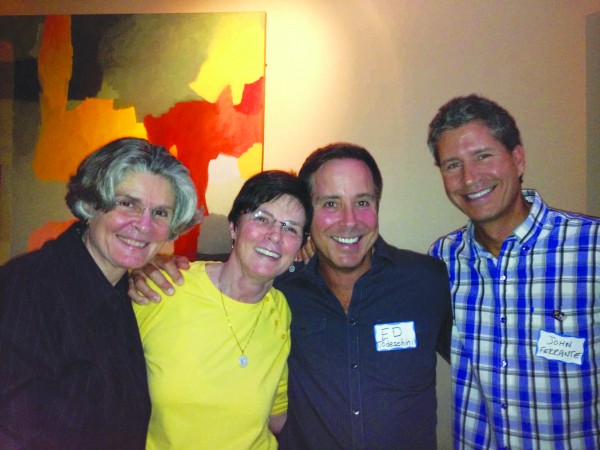
Friday, June 26, “was probably one of the most thrilling days of my life,” said former Laguna Beach Mayor Bob Gentry, referring to the U.S. Supreme Court ruling that affords same-sex couples the constitutional right to marriage.
“Most of my generation of gays and lesbians grew up not even able to think about marriage, family, stability, security, or long-term care for each other,” said Gentry, the first openly gay elected official in Orange County in 1982. The status earned him bundles of hate mail, but allowed him to forge a path towards LGBT equality locally for others, such as Laguna Beach resident Greg Collins.
For Collins, the Supreme Court decision means security for his family. He married his husband in 2008, during the brief five months that same-sex marriage was legal in California before the passage of Proposition 8, which was subsequently struck down in 2013 on appeal to the U.S. Supreme Court. Their then 18-month old son was the ring-bearer at the wedding. They’ve since adopted another son, but found it hard to explain that their marriage was not recognized in some states. With the historic ruling, Collins says he sleeps better knowing his boys can be assured their parents’ vows are legally recognized in all states.
He praised President Obama’s speech reacting to the ruling by addressing the country “in a way that made me feel included and validated as an American in profound ways that I had never experienced before, and that perhaps others take for granted.”
“It was almost hard to comprehend that we had gone from such hatred towards us in 2008” to “such a happy day” last Friday, said Laguna Beach resident Audrey Prosser, whose peaceful demonstrations protesting Prop. 8 were rewarded with hate mail and an assault by a man attempting to wrench a sign away Main Beach. She began fighting for LGBT rights in the early ‘80s, a fight she continued even after marrying her partner in 2008. Meeting Gentry, who was mayor of Laguna when she arrived in 1989, further inspired her.
In Laguna, during his tenure on the City Council from 1982 to 1995, Gentry helped push through three laws advancing gay rights locally. Two prohibited discrimination against sexual orientation for housing, employment or public accommodations, and against people with AIDS, respectively. A third law passed in 1992 created a domestic partnership registration for same-sex couples, giving them such rights as visiting partners in the hospital and control of their companion’s remains and property after death.
Gentry didn’t benefit from his actions in Irvine. In 1989, he was denied time off from his post as associate dean of students to care for his ailing partner, who later died from AIDS. That was a benefit only available to employees caring for their legal spouses, children and in-laws.
Even so, Gentry’s actions helped others. He said he received anonymous messages from young gays thanking him for giving them job security. Others remember the welcoming environment in Laguna.
“I started to come out when I was 18, and Laguna Beach was the place that was our haven at that time,” said Santa Ana resident Jeff Brumett, 53, involved with the Human Rights Campaign, an organization supporting LGBT equal rights.
“We never dreamed that we would have any type of equality. Our equality was the equality we felt when we were meeting at the Boom Boom Room.” he said, crediting the men he met in those years, many of whom died in the ‘80s, with mentoring him and preventing him from feeling ostracized. “I’m so grateful this happened in their honor,” he said.
Stephen Jacobs and Frank Schaffer of the eponymous Laguna garden and home store, Stephen Frank, on Forest Avenue, have a different story. “Love Wins” reads the subject line of an e-mail Jacobs sent out Friday with a link to his blog.
There, he describes a love-at-first-sight sort of encounter that led to Jacobs and Schaffer making a lifelong commitment 27 years before the 2008 window opened, allowing same-sex marriage in California. They wore rings to signify their union and took care of each other in sickness. They wondered if they really needed a piece of paper to prove their relationship, but the pending Prop. 8 initiative, which could take away their right to marry, gave them pause.
“If we passed up the right that had been granted us then we had no excuse to protest if that same right was taken away,” writes Jacobs. So on the way home from lunch with friends the day before the 2008 election that would indeed take away that right, they stopped at the nearest courthouse. When the clerk asked if they had rings and they handed him the rings they’d been wearing for so many years, the emotions got the best of them:
“Here we were in front of a total stranger, laying bare our lifelong commitment to each other. The tears didn’t stop. Even writing this today, nearly seven years from that moment and nearly 34 years from our first meeting, the emotions are still there. And the joy and the love,” writes Jacobs. “We’re grateful to the Supreme Court today for recognizing the validity of marriage for all.”
“So many people have been fighting for this for so long, and it’s just incredible that we’re living to see it,” said Laguna Beach resident Michelle Bentcliff, who is on the steering committee for HRC in Orange County. Even though she and her wife also married in 2008, she stressed the importance of federal legalization. Until now, for example, if they traveled to a state that didn’t recognize their marriage and one of them had to be hospitalized, they could be denied visiting rights.
Even so, Bentcliff said there is still “so much work to be done,” noting that the right to marry does not broadly confer equal rights to gay people since many states still lack laws that prohibit discrimination based on sexual orientation in housing and the workplace.
“I’m full of joy, but there are still 29 states where you can get married on Sunday and fired on Monday. That just doesn’t make sense,” agreed Brumett.




